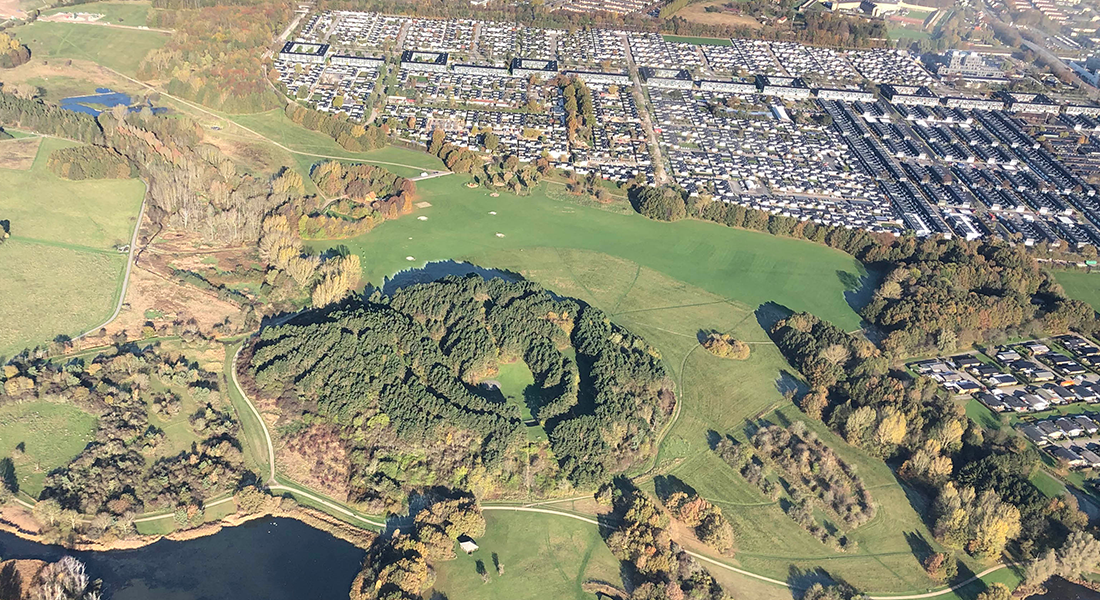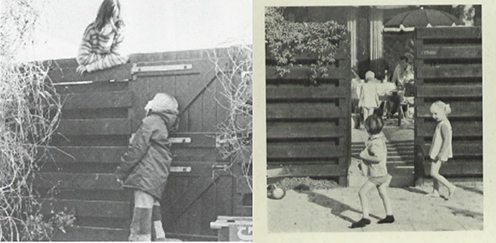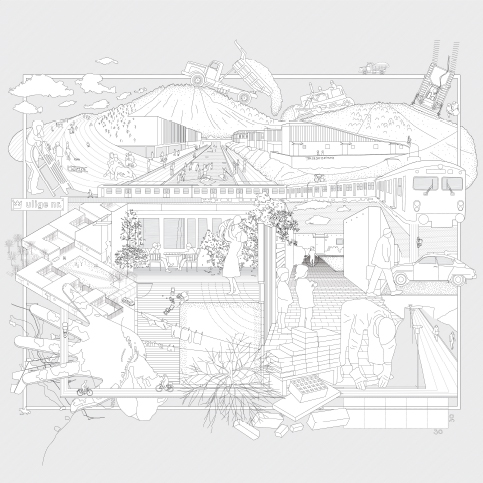Reconfiguring Welfare Landscapes

PROJECT IS CLOSED
Project period: 2016 to 2020
This project explored relationships between landscapes of social housing and the construction of the Danish welfare state in the post-war period. The project established a new understanding of landscapes of social housing as ‘welfare landscapes’, contributed to the debate on their future preservation and development and created new knowledge about architecture and welfare politics from a landscape perspective.
Access to open spaces was considered pivotal for ensuring the social welfare and individual wellbeing of residents in the numerous social housing estates built as a cornerstone of welfare politics between 1945-1975. Many of these became internationally renowned for precisely their high quality designed landscapes, while social housing estates have also long been blamed for being socially and physically problematic, culminating recently with the 2018 Danish national ghetto policy. Today, welfare landscapes of social housing are substantially transformed to meet new challenges ranging from material decay, to spatial and social segregation, to climate adaptation and new ways of life.
The Reconfiguring Welfare Landscapes (Welland) project provided knowledge about post-war open spaces’ material and spatial qualities, their social and cultural uses and how they are related to shifting ideas about welfare. Moreover, the project prototyped a research strategy to foster a relational understanding of welfare landscapes of social housing.
Welland was based on interdisciplinary and innovative research bridging design and humanities by exchanging landscape architecture, urban design, cultural studies and architectural philosophy and making use of a wide set of research methodologies also deploying creative practices as design and exhibitions as knowledge exchange and production means.
Talks
2018: Ellen Braae presents Welfare Landscapes at the Scandinavian Affordable Housing Futures, CAFX Copenhagen Architecture Festival Copenhagen 2018.
2018: Anne Tietjen keynote Welfare Landscapes Revisited at UNISCAPE conference Healthy Landscapes in Bologna.
2018: Svava Riesto presents Welfare Landscapes as (un)sustainable heritage at the Association for Critical Heritage Studies conference Heritage Across Borders in Hangzhou.
2018: Ellen Braae and Svava Riesto present Reconfiguring Welfare Landscapes at the Nordic Network for Architecture and Welfare conference Architecture, Welfare and the Recent Past, Oslo School of Architecture and Oslo University.
2018: Ellen Braae presents Reconfiguring Welfare Landscapes at the Swedish University of Agricultural Sciences research seminar on Welfare & Landscapes.
2018: Ellen Braae and Svava Riesto present Reconfiguring Welfare Landscape at the seminar Researching Mass Housing at the University of Copenhagen.
2018: Lærke Keil presents The Element of Welfare Landscapes at the European Network for Architecture History conference The Tools of the Architect in Delft.
2018: Svava Riesto and Tom Avermaete present papers on biographical approaches to welfare landscape research at the Re:Scape Colloquium Constructing Biographies of Welfare Landscapes.
2017: Ellen Braae, Henriette Steiner, Anne Tietjen, Svava Riesto, Lærke Keil and Asbjørn Jessen present papers from the project at Landscape Futures UNISCAPE conference, Copenhagen.
2017: Ellen Braae presents Welfare Landscapes at the seminar The Housing Question, Making Effect FORMAS conference, Stockholm.
Publications
Expanding Danish welfare landscapes: Steen Eiler Rasmussen and Tingbjerg housing estate / Braae, Ellen Marie & Steiner, Henriette, 1 Jan 2022, Landscapes of Housing: Design and Planning in the History of Environmental Thought. Haffner, J. (ed.). New York: Routledge, p. 146-167 22 p.
Danske velfærdslandskaber - værdier i forandring / Braae, Ellen Marie, May 2022, Kulturmiljøer i forandring – fokus på efterkrigstidens boligforstæder. Kristensen, H. (ed.). Dansk Byplanlaboratorium, Vol. 82. p. 22-27 6 p. (Byplanhistoriske skrifter).
Vigtigheden af det grønne rum: Der stilles store krav til de sparsomme friarealer omkring byens boliger / Braae, Ellen Marie, 2022, In: Arkitekten. 124, 6, p. 66-70 5 p.
Gigantic welfare landscapes and the ground beneath Høje Gladsaxe / Steiner, Henriette, 2021, In: Landscape Research. 46, 4, p. 527-541 15 p.
Welfare Landscapes Between Individuality and Communality: Social housing in Albertslund Syd / Keil, Lærke Sophie, Riesto, Svava & Avermaete, T., 2021, In: Landscape Research. 46, 4, p. 456-473 18 p.
Assembling Welfare Landscapes of Social Housing: Lessons from Denmark / Jessen, A. & Tietjen, Anne, 2021, In: Landscape Research. 46, 4, p. 474-494 21 p.
European mass-housing welfare landscapes / Braae, Ellen Marie, Riesto, Svava, Steiner, Henriette & Tietjen, Anne, 2021, In: Landscape Research. 46, 4, p. 451-455 5 p.
Non-site welfare landscapes on-site: curated displays of transformed social housing estates / Braae, Ellen Marie, 2021, In: Landscape Research. 46, 4, p. 542-557 16 p.
Welfare Landscapes: Open Spaces of Danish Social Housing Estates Reconfigured / Braae, Ellen Marie, Riesto, Svava, Steiner, Henriette & Tietjen, Anne, May 2020, Mass Housing of the Scandinavian Welfare States: Exploring histories and design strategies. Glendinning, M. & Riesto, S. (eds.). Edinburgh: University of Edinburgh, p. 13-23 10 p.
Editorial: Mass housing of the Scandinavian Welfare States. Exploring histories and design strategies / Riesto, Svava & Glendinning, M., 2020, Edinburgh: University of Edinburgh.
Velfærdslandskaber – efterkrigstidens drømmefabrik / Braae, Ellen Marie, Sep 2020, Gentænk byen: Byen uden grænser, byer og det gode liv, byer I bevægelse, byernes klimaudfordringer. jørgensen, G., winther, L., jensen, E. H., nørgaard, M., møller, K. S. & folvig, S. (eds.). Copenhagen: Dansk Byplanlaboratorium, p. 85-92 9 p.
The Sustainable Nordic City of the Future is the City we Already Have / Braae, Ellen Marie & Steiner, Henriette, 2019, NORDIC WORKING PAPERS Opportunities and challenges for future regional development - notes from an open seminar, September 12, 2019. Nilsson, K. (ed.). Copenhagen: Nordic Council of Ministers, p. 31-39 9 p. (Nordiske Arbejdspapirer, Vol. 910).
Velfærdslandskaber / Braae, Ellen Marie, Oct 2019, Levende Bygningskultur: En essaysamling.Høi, A. (ed.). København, p. 24-33 9 p.
Velfærdssamfundets bygningskultur og klimakrisen / Riesto, Svava, 20 Nov 2019, 5 p. København : Realdania.
Reconfiguring welfare landscapes – A spatial typology / Jessen, A. & Tietjen, Anne, 27 Sep 2017, Polytechnic University of Valencia Congress, 24th ISUF 2017 - City and Territory in the Globalization Age.
Welfare Landscape and Communities / Braae, Ellen Marie, 6 Oct 2017, Forming Welfare. Lotz, K., Simpson, D., Raahauge, K. M., Vindum, K., Jensen, M. J. & Bendsen, J. R. (eds.). Arkitektens Forlag, p. 34-49 15 p.
Inspiration at hente i 'hårde ghettoers' glemte, grønne landskaber: Artikel i Fagbladet Boligen / Hansen, Regner; Riesto, Svava.
BL Danmarks Almene Boliger. 2019, Interview with Svava Riesto and Ellen Braae about teaching and research in welfare landscapes.
Beboerne ville ikke kalde det grønne ørkner. Interview with Svava Riesto about social housing landscapes. Grønt Miljø. 2019, 9.
Fredning og de almene boligbebyggelser / Riesto, Svava; Rikke, Stenbro, By og Land, Vol. 123, 2019, p. 20-24.
Education
2018: 45 international and Danish MSc students at The Urbanism Studio course explores the 1970 housing area, Folehaven, aiming for an acknowledging approach. Teachers: Ellen Braae, SLETH office (Lars Jensen and Jeppe Bonne Olsen), Josh Reed and Peng Ding.
2018: 55 international and Danish students study the Master level course Affordable Housing Landscapes between home and common (MSc Theories and Methods in Landscape Architecture,15 ects) 2018. The course studies Danish social housing estates from the 1960s and 1970s and contemporary social housing, in which landscape plays significant roles. By discussing the key challenges for affordable housing landscapes in the present and by in-depth studies of the characteristics and capacities of specific housing landscapes, the course discusses the role of landscapes in housing estates and in cities, in a past, present and future perspective. Teachers: Svava Riesto, Ellen Braae, Kristen van Haaren, Lærke Keil.
2018: Students with a particular interest in Welfare Landscapes begin their work on master thesis projects on Welfare Landscapes supervised by Ellen Braae and Svava Riesto and carried out in contact with the research project.
2018: First year students of landscape architecture explore photography on recent housing estates in Greater Copenhagen (BSc Plan and Design 15 Ects) with Ellen Braae.
2017-2018: Erasmus + teacher exchange with the Technical University Delft. The master course on Methods and Analysis studies Dutch and Danish welfare landscapes from the 1960s and 1970s with fieldwork and workshops in Copenhagen. Lærke Keil and Svava Riesto are guest teachers at the course in Delft. In collaboration with Willemijn Wilms Floet and Hans Terdes, TU Delft.
The project was organised into four work packages
SP1: Practicing Wellfare Landscapes


Practicing Welfare Landscapes questions the social role of Danish post-war housing estates from a landscape perspective.
The many large-scale housing estates that were realized in Denmark 1945-1975 relied on novel ideas about how the physical landscape could improve the lives of their residents. Yet, despite these high ambitions, the social capacities of these landscapes have been subject to massive critique. Surprisingly, however, despite of the numerous contemporary renewal projects, little knowledge exists about the social roles of these landscapes.
This sub-project takes a deep dive into selected Danish social housing landscapes and explores how their material articulation relates to specific ideas about social welfare, individual wellbeing and citizenship in the welfare state.
We seek to inform the contemporary debate about renewal, preservation, demolition and renovation by showing how specific welfare landscapes absorb frictions by alternating social practices over time. Further, we develop theoretical concepts and methodologies to study how physical landscape elements and figures are entangled with shifting and contested ideas concerning the collective and the home, childhood, gender, individuality and more.
Svava Riesto, Associate Professor, Cand.Mag., PhD (Subproject 1 leader)
Lærke Sophie Keil, PhD-fellow
Tom Avermaete, Professor, ETH
SP2: Materialising Welfare Landscapes


Materialising welfare landscapes (of social housing) explores how welfare materialised in and around the landscapes of three iconic post-war social housing estates in metropolitan Copenhagen; how these welfare landscapes have been transformed in relation to changing spatial practices and ideas about welfare, housing and the city; and how welfare landscapes could be materialised in the future according to new challenges and political agendas. Drawing on actor-network theory the project unpacks dynamic relationships between things, people and ideas as socio-material assemblages across multiple scales from the local open space to the city and the region at large. Through analytical maps and drawings and speculative projects for possible futures the project aims at contributing to a new relational understanding of welfare landscapes to inform their future transformation and to add to an emerging body of knowledge about relationships between welfare and spatial design from a landscape perspective.
Anne Tietjen, Associate Professor, Architect MAA, PhD (Subproject 2 leader)
Asbjørn Jessen, Landscape Architect MAA MDL (PhD fellow)
SP3: Welfare Imagined


Welfare Imagined exposes conflicting discourses of Danish post-war housing estates, documenting, analysing, and experimenting with the diverse narratives, images and ideas they have fostered. With a focus on the ‘green’ open spaces, visual and written archival material is studied alongside more recent cultural representations of the estates and their landscapes e.g. novels or films. This is complemented by on-site explorations e.g. with photography, thereby contributing to a re-configuration and re-conceptualization of the housing estates by means of creating new representations. We hereby aim to historicize, contextualize and provide a framework for critical discussion of the Danish post-war landscape architecture tradition and, in this way, illuminate the changing ideas behind the very concept of ‘welfare’ in this context.
Henriette Steiner, Associate Professor, Cand.Mag., PhD (Cantab) (Subproject 3 leader)
Kristen Van Haeren, PhD fellow
Anne Whiston Spirn, Professor MIT, AB member
SP4: Ariadne
 Ariadne is to bring together and synthesize the knowledge produced by the three other subprojects into one methodological framework for understanding spatial quality in Danish postwar social housing estates in a past-present-future perspective. On an everyday level, the Ariadne subproject works as a managerial strategy, vertically securing the exchange of the Welland-group and the Advisory Board and the exchange between the triple-layered group-structure formed by the landscape architect PhD-fellows, the subproject leaders representing and expanded field of knowledge and the PI. Horizontally the Ariadne subproject ensures the project’s progress by weaving together and exchanging knowledge on various levels throughout the process. From setting up internal working seminars on key-terms, framing the collaborative topics with the advisory board to steering the accumulative and synthesizing processes into seminars and publication and dissemination.
Ariadne is to bring together and synthesize the knowledge produced by the three other subprojects into one methodological framework for understanding spatial quality in Danish postwar social housing estates in a past-present-future perspective. On an everyday level, the Ariadne subproject works as a managerial strategy, vertically securing the exchange of the Welland-group and the Advisory Board and the exchange between the triple-layered group-structure formed by the landscape architect PhD-fellows, the subproject leaders representing and expanded field of knowledge and the PI. Horizontally the Ariadne subproject ensures the project’s progress by weaving together and exchanging knowledge on various levels throughout the process. From setting up internal working seminars on key-terms, framing the collaborative topics with the advisory board to steering the accumulative and synthesizing processes into seminars and publication and dissemination.
Ellen Braae, Professor, Architect MAA, PhD (Subproject 4 leader)
Anne Tietjen, Associate Professor, Architect MAA, PhD
Henriette Steiner, Associate Professor, Cand.Mag., PhD
Svava Riesto, Associate Professor, Cand.Mag., PhD
Project participants
| Name | Title | |
|---|---|---|
|
Professor, IGN, KU |
||
|
Asbjørn Jessen |
Project Employee |
|
|
Professor, IGN, KU |
||
|
Associate Professor, IGN, KU |
||
|
Kristen van Haeren |
Project Employee | |
| Lærke Sophie Keil | Assistant Professor, IGN, KU | |
| Svava Risto | Associate Professor, IGN, KU |
Advisory Board
| Name | Title | |
|---|---|---|
| Anne Whiston Spirn | Professor, MIT | |
| Thordis Arrhenius | Professor, KTH | |
| Tom Avermaete | Professor, ETH Zürich | |
| Paola Viganó | Professor, UIVA | |
| Rodney Harrison | Professor, UCL |
Project
Welland – Reconfiguring Welfare Landscapes
Welland is a 4-year research project funded by the Independent Research Fund Denmark.
Periode: 2016-2020
The project is hosted by the section for Landscape Architecture and Planning.

